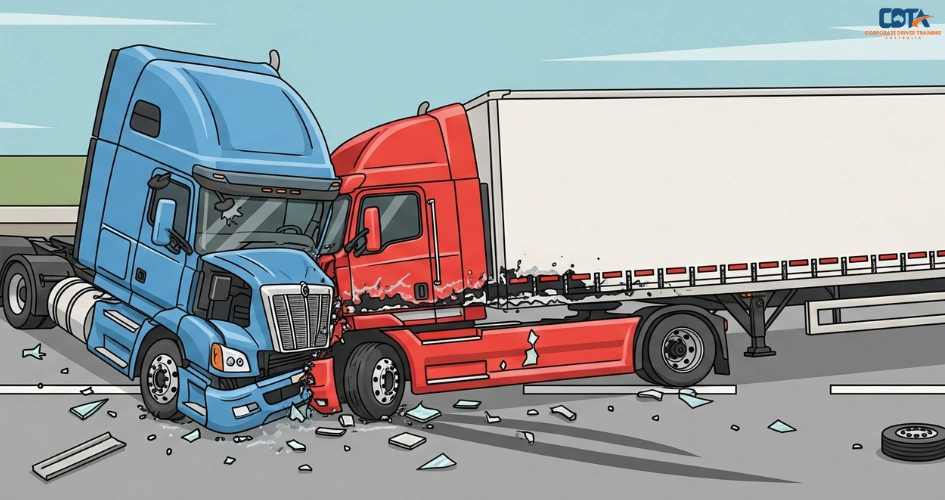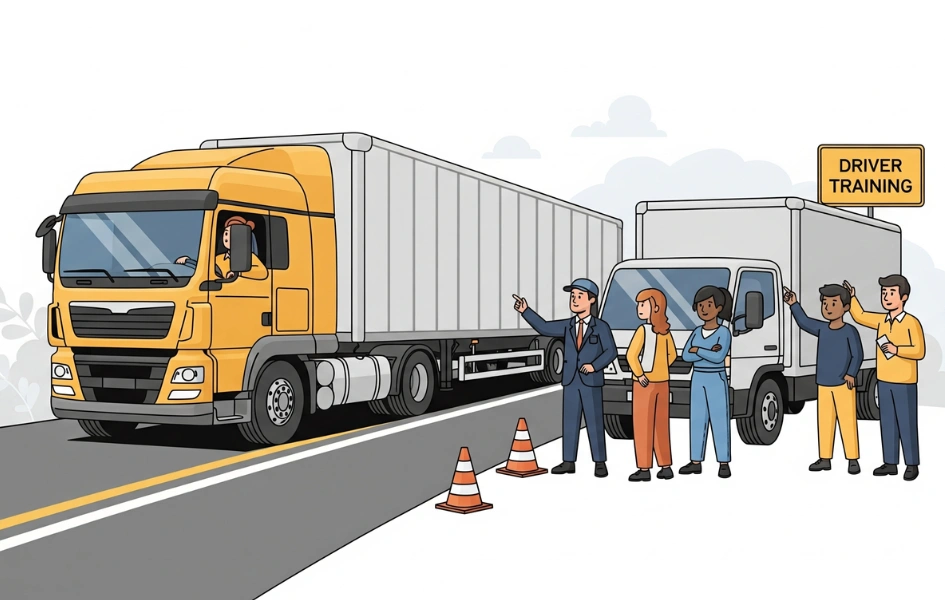
Life is a fickle thing, full of uncertainties. Why make it even more uncertain with rash and unsafe driving? The news out of Queensland is a sobering one: on August 21, two truck drivers lost their lives in a devastating head-on collision on the D’Aguilar Highway. This incident is not a one-off; accidents are a sad reality of this country. However, it is a stark and painful reminder of the risks faced by professional drivers every day. It’s time for companies, fleet managers, and drivers themselves to wake up and smell the coffee. While the specifics of this crash are tragic, the bigger lesson in it goes far beyond one stretch of road. It underscores the vital importance of professional development and ongoing safety education for drivers. It also reminds us why comprehensive corporate driver training is no longer an option - it’s a necessity.
Understanding the Queensland Crash
It was in the early morning hours on August 21 that a quietly busy D’Aguilar Highway bore witness to a tragic event where a fuel tanker and a transport truck collided head-on. The collision caused a catastrophic fire and the tragic loss of two lives, the drivers involved. The victims, men in their 30s and 50s, were seasoned drivers, highlighting that experience alone is not always enough to prevent accidents on challenging roads. Emergency services closed the highway for hours, and investigations are ongoing, but the human cost is already immeasurable.
While headlines captured the tragic event, the bigger takeaway in this collision was what it revealed about road safety and professional driving practices in the country. This accident, and every other collision, is more than a statistic. It is a life lost and a family, a community, and a business impacted forever. These crashes are a reminder that we should be proactive about road safety instead of just reacting to it.
D’Aguilar Highway and Queensland Road Safety Challenges
Queensland residents would know that the D’Aguilar Highway is notorious for being narrow and rough and lacking overtaking opportunities, particularly between Woodford and Kilcoy. Some sections of the highway have a very low safety rating. In fact, it also ranked eighth in a 2024 survey of the Top 10 worst roads. With increasing traffic and maintenance issues, this highway is a high-risk route for heavy vehicles.
However, this crash is not an isolated incident. The Nanago electorate also witnessed the highest number of trauma cases between 2019–2023. The death toll in Queensland in 2024 was 302 deaths, with 187 fatalities already reported so far in 2025. These numbers paint a worrying picture, highlighting the rising road safety challenges that governments face. Beyond infrastructure improvements, it is also crucial to pay more attention to corporate driver training, to teach drivers how to stay safe on high-risk roads and reduce the likelihood of accidents.

Why Corporate Driver Training Saves Lives
Professional driver training is about learning driving skills, vehicle maintenance, proper driving etiquette, improving hazard perception, judgment, decision-making, and the right approach to driving. For companies with commercial fleets, it is an investment in safety, skill, and long-term risk management. Effective corporate driver training teaches drivers to stay safe and drive responsibly, even on challenging roads like the D’Aguilar Highway. It usually includes, but isn’t limited to:
-
Defensive Driving Techniques: Teaching drivers to drive safely, anticipate potential hazards, and react safely to them.
-
Hazard Perception: Teaching drivers to identify risks early, whether it’s a blind corner, deteriorating road surface, or unexpected hazards like a wild animal jumping onto the road.
-
Fatigue Management: Helping drivers to recognise the signs of fatigue and manage rest schedules effectively, reducing the risk of accidents caused by tiredness.
-
Vehicle-Specific Training: Teaching drivers to understand the distinct features of large vehicles like trucks or tankers, including braking distances, load distribution, and cornering safety.
With professional training, drivers can respond quickly to hazards, minimise incidents, and maintain the safety of everyone on the road. By investing in advanced corporate driver training services, companies can protect their drivers and also safeguard their business operations.
Take Action: Prioritise Driver Safety Today
The Queensland tragedy is a powerful reminder that safety cannot wait. Avoiding even a single accident can save a life, protect a family, and preserve a fleet. At Corporate Driver Training Australia, we are dedicated to providing the highest standard of training to help our clients navigate the roads safely, no matter the conditions. We serve all major Australian cities, including Melbourne, Sydney, Brisbane, Adelaide, Perth, Darwin, and Hobart, and our mission is to ensure that every driver on the road comes home safely.
Don’t wait for a tragedy to happen. Take immediate steps to safeguard your fleet. Contact us today to learn more about our comprehensive corporate driver training programs and discover how investing in your drivers’ skills can make a life-saving difference.
Frequently Asked Questions
Q: Why should professional drivers do corporate driver training?
A: Corporate driver training teaches drivers to stay safe. It teaches defensive driving, vehicle maintenance, hazard awareness, fatigue management, and how to handle specific vehicles. These skills can make the difference between a close call and a serious accident.
Q: How can training prevent crashes like the D’Aguilar Highway incident?
A: Training helps drivers spot potential risks early, respond effectively to other road users, and navigate tricky road conditions. On dangerous roads like the D’Aguilar Highway, these skills can be life-saving.
Q: What makes the D’Aguilar Highway so risky for trucks?
A: The highway has a very low safety rating, few overtaking lanes, and some poor road conditions. It also ranked eighth in a 2024 survey of the Top 10 worst roads. Even experienced drivers need the right training to stay safe on this route.
Q: Who benefits from Corporate Driver Training programs?
A: Any business with professional drivers can benefit from our corporate driver training courses. Whether you run a transport company or manage a commercial fleet, drivers across Melbourne, Sydney, Brisbane, Adelaide, Perth, Darwin, and Hobart can gain skills to stay safer on the road.
Q: What specific skills are taught in corporate driver training?
A: Programs cover defensive driving, hazard perception, managing fatigue, and vehicle-specific handling for trucks and large vehicles. These skills help drivers make safer decisions and protect both themselves and their fleet.